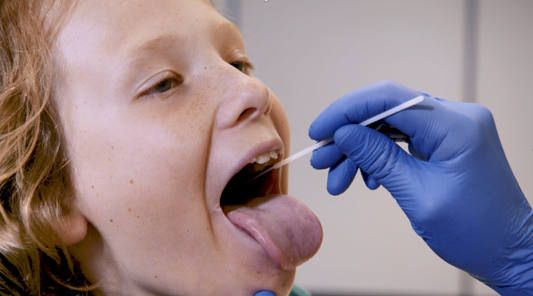Search
Research
Unfinished business and self-blaming emotions among those bereaved by a COVID-19 deathIn view of the mounting death toll of COVID-19 worldwide and the complicating circumstances that commonly accompany such losses, we studied the grief experiences of 209 adult mourners who lost a loved one to coronavirus with a focus on self-blaming emotions and unresolved issues with the deceased.
Research
Validation of a rapid, saliva-based, and ultra-sensitive SARS-CoV-2 screening system for pandemic-scale infection surveillanceWithout any realistic prospect of comprehensive global vaccine coverage and lasting immunity, control of pandemics such as COVID-19 will require implementation of large-scale, rapid identification and isolation of infectious individuals to limit further transmission. Here, we describe an automated, high-throughput integrated screening platform, incorporating saliva-based loop-mediated isothermal amplification (LAMP) technology, that is designed for population-scale sensitive detection of infectious carriers of SARS-CoV-2 RNA.
Research
Complications associated with paediatric airway management during the COVID-19 pandemic: an international, multicentre, observational studyRespiratory adverse events in adults with COVID-19 undergoing general anaesthesia can be life-threatening. However, there remains a knowledge gap about respiratory adverse events in children with COVID-19. We created an international observational registry to collect airway management outcomes in children with COVID-19 who were having a general anaesthetic.
Research
The Mental Health Implications of Domestic Violence During COVID-19Citation: Newnham EA, Chen Y, Gibbs L, Dzidic PL, Guragain B, Balsari S, et al. The Mental Health Implications of Domestic Violence During COVID-19.
Research
Variation in excess all-cause mortality by age, sex, and province during the first wave of the COVID-19 pandemic in ItalyAlthough previous evidence suggests that the infection fatality rate from COVID-19 varies by age and sex, and that transmission intensity varies geographically within countries, no study has yet explored the age-sex-space distribution of excess mortality associated with the COVID pandemic.
Research
Consensus guidelines for the diagnosis and management of invasive aspergillosis, 2021Invasive aspergillosis (IA) in haematology/oncology patients presents as primary infection or breakthrough infection, which can become refractory to antifungal treatment and has a high associated mortality. Other emerging patient risk groups include patients in the intensive care setting with severe respiratory viral infections, including COVID-19.
Research
Achieving universal electrification of rural healthcare facilities in sub-Saharan Africa with decentralized renewable energy technologiesA potential response to the COVID-19 pandemic in sub-Saharan Africa (SSA) with long-term benefits is to provide electricity for medical equipment in rural health centers and communities. This study identifies a large gap in the electrification of healthcare facilities in SSA, and it shows that decentralized photovoltaic systems can offer a clean, reliable, quick, and cost-effective solution.
Research
Can positive mindsets be protective against stress and isolation experienced during the covid-19 pandemic? A mixed methods approach to understanding emotional health and wellbeing needs of perinatal womenThe aim of this study was to explore the relationship between emotional health and wellbeing and support needs of perinatal women during the COVID-19 pandemic, and to understand their experiences and need for support. This is a potentially vulnerable group and a critical developmental phase for women and infants.

News & Events
COVID tests well tolerated by WA school kidsA study conducted across 40 WA schools has found COVID-19 testing using a combined nose and throat swab was well tolerated by children as young as 4 years.

News & Events
Minderoo Foundation funds vaccine trial to protect WA healthcare workers from COVID-19At least 2,000 WA healthcare workers will help test whether an existing tuberculosis vaccine can reduce their chance of COVID-19 infection, lessen the severity of symptoms and boost immunity.
